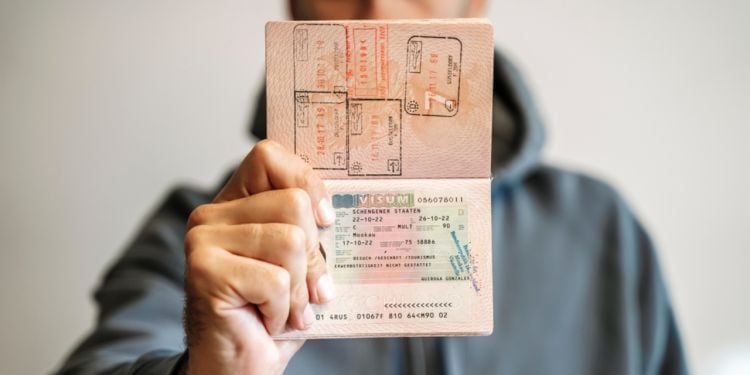
When traveling to Australia, it is necessary to get a visa from the Department of Immigration before confirming your overseas travel. Types of visas vary according to the length of stay in Australia, how long you intend to stay, and the home country of the applicant, so it is best to consult with the Department of Immigration if you are unsure as to what visa is applicable to you.
The Electronic Travel Authority (ETA) Visa in Australia
The ETA visa is the most common tourist visa for visitors coming to Australia for up to three months. The ETA is not a physical visa or label in your passport; rather, the visa is stored electronically and tied to your passport number.
You can apply for this visa via the ETA app, and the application process is very easy and straightforward. The average processing time is less than one day. The ETA allows visa holders to travel to Australia as many times as needed, within 12 months of the approval date, for stays of up to three months each time. If you are unable to use the app, you can apply online via ImmiAccount for another visa that suits your needs.
The ETA visa covers tourism and limited business purposes. As per the Department of Immigration website, business purposes related to the ETA Visa include:
- Making general business or employment inquiries.
- Investigating, negotiating, signing or reviewing a business contract.
- Activities carried out as part of an official government-to-government visit.
- Participating in conferences, trade fairs or seminars, as long as you are not being paid by the organizers for your participation.
Conditions for applying for an ETA
To apply for this visa, you must have a valid passport for each person who will be traveling. The visa itself is free of charge, but there is an AUD 20 service fee per applicant.
Important:
Watch out for third-party providers who claim to provide the ETA for you. There should be no costs for this visa category aside from the service fee. Always make sure you are using the government website and app to avoid any scams.
All family members or the party traveling - including children - must have their own ETA visa. If you have any criminal convictions in your home country, you are not eligible for this visa and should apply for the Visitor Visa (subclass 600) instead. You also must not have any debts to the Australian government when applying for this visa. Other conditions include health requirements, to maintain Australia's high health standards and character requirements (which ties in with any criminal offenses you may have). You must also only intend to stay temporarily in Australia and adhere to the conditions and period attached to your visa.
While in Australia on an ETA Visa, you are not covered by Medicare, Australia's national health care system. Therefore, it is essential to have your own health and travel insurance for the duration of your visit.
You can apply for an ETA if you hold a passport from: Andorra, Austria, Belgium, Brunei, Canada, Denmark, Finland, France, Germany, Greece, Hong Kong (SAR of China), Iceland, Ireland, Italy, Japan, Liechtenstein, Luxembourg, Malaysia, Malta, Monaco, Norway, Portugal, Republic of San Marino, Singapore, South Korea, Spain, Sweden, Switzerland, Taiwan (excluding official or diplomatic passports), The Netherlands, United Kingdom, United States of America, and the Vatican City.
You can't apply with a non-citizen passport, certificate of identity, or other travel document. If you are not on the above list, please check the Home Affairs web page for a variety of visas.
Other short-term visa options for visitors to Australia
Though most short-term visitors will be able to use the ETA, which is the easiest and most affordable option, there are other visa classes for those who are seeking a slightly longer stay in Australia or who do not possess a passport from one of the countries listed above. These options include:
- Visitor Visa (subclass 600): This visa is intended for people who want to visit Australia for tourism or business purposes. It allows a stay of up to 3, 6, or 12 months in Australia, depending on the applicant's circumstances, and it costs AUD 150.
- eVisitor (subclass 651): This visa is intended for people from specific European countries who are visiting Australia for tourism or business purposes for up to 3 months. As with the ETA, it is also an electronically stored authority for travel to Australia, and you do not need a physical visa label or stamp in your passport.
- Working Holiday visa (subclass 417 or 462): These visas are intended for young people aged 18 to 30 (or 35 in the case of subclass 417) who want to holiday and work in Australia for up to 12 months. This visa allows multiple entries into Australia during the validity period, but you can only work with the same employer for up to 6 months. It costs AUD 510. You are able to apply for a second and even a third version of this visa, depending on your situation. Which subclass you apply for depends on where you are from.
Long-term visa categories in Australia
If you are hoping to be in Australia longer than the three-month period your ETA allows, or if you have fallen in love with the country after a brief visit, or are too old for a working holiday visa, then there are a number of options for those seeking a more permanent home in Australia. Some of these visa options include:
Skills-based visas in Australia
The Skilled Independent visa (subclass 189), Skilled Nominated visa (subclass 190), and the Employer Nomination Scheme visa (subclass 186) are three of the most popular skilled immigration visas in Australia, developed to draw highly skilled workers to fill shortages in the Australian labor market. If you are lucky enough to be in possession of skills and experience that is highly sought after in Australia, then either of these visa options is an excellent way to achieve residency in Australia.
- The Skilled Independent visa (subclass 189) is a permanent residency visa that does not require sponsorship from an employer, state or territory government, or family member. The way applicants are assessed is via points, which means that you must meet certain criteria and score a minimum number of points to be eligible. Applicants must have a nominated occupation that is on the Skilled Occupation List (SOL), be proficient in speaking English, and pass health and character checks.
- The Skilled Nominated visa (subclass 190) is also a permanent residency visa, but it requires nomination from a state or territory government in Australia. As with subclass 189, this visa is also points-tested, and applicants must meet the same basic requirements. However, they must be nominated by a state or territory government agency and commit to living and working in that state or territory for a minimum of two years.
- Similar to the Skilled Nominated visa, the Employer Nomination Scheme visa (subclass 186) is a permanent residency visa that allows skilled workers to work in Australia while being sponsored by an employer rather than by a government body. This visa is also designed to fill skill shortages in the labor market but applicants must have received a job offer from Australian employer.
All three of these visas are highly competitive, which is understandable – they come with significant benefits, such as permanent residency in Australia, access to Medicare (Australia's public healthcare system), and other social services. Even better, permanent residents can sponsor eligible family members for visas to join them in Australia.
Business and investment visa options in Australia
The Business Innovation and Investment visa (subclass 188) is a temporary visa designed for those entrepreneurial types who want to invest in or start and manage a business in Australia. This visa is points based and offers a pathway to permanent residency if you meet the eligibility criteria and manage to successfully operate your business in Australia.
The subclass 188 visa has five streams, each with its own specific requirements. The Business Innovation stream is for individuals who want to establish and run a new or existing business in Australia. Applicants must have a successful business career and score at least 65 points on the points test. The Entrepreneur stream is for individuals who have a funding agreement from a third party for at least AUD 200,000 that will be spent on an entrepreneurial activity. The final three streams (investor, significant, and premium) may be out of the reach of most people as they require large amounts of capital. The first requires a net worth of at least AUD 2.25 million and an investment of AUD 1.5 million in an Australian state or territory government security; the second stream involves a minimum investment of AUD 5 million; to be eligible for the third stream, applicants must be nominated by Austrade and make a minimum investment of AUD 15 million in Australian investments.
Student visa options in Australia
If you're a student and you're looking to study in Australia, you'll need to apply for a student visa. The student visa (subclass 500) allows international students to stay in Australia for the duration of their study program.
To be eligible for a student visa, you'll need to have received an offer of admission from an Australian educational institution, be enrolled in a full-time course of study, and have sufficient funds to support yourself while you're in Australia. You'll also need to meet health and character requirements, and have adequate health insurance coverage while you're in Australia.
The student visa application process can be pretty complex, and you'll need to provide a range of documentation to support your application. This might include your academic transcripts, proof of English language proficiency, and evidence of your financial capacity to support yourself while you're in Australia.
One of the great things about the Australian student visa is that it allows you to work part-time while you're studying. You can work up to 40 hours per fortnight during the academic year and full-time during school breaks. This can be a great way to offset your living expenses and gain some valuable work experience in Australia.
We do our best to provide accurate and up to date information. However, if you have noticed any inaccuracies in this article, please let us know in the comments section below.












Comments